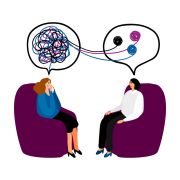
Psychology
Psychology is the study of the mind and behavior. It arose as a discipline distinct from philosophy in the late 19th century.
The mind is so complex and so dynamic—it is changing as you read these words—and so much of its information processing happens below the level of conscious awareness that experts have long struggled to understand its functions and dysfunctions.
In addition, human behavior is so varied that psychology extends its reach into many areas of activity. In general, research psychologists are those who study the many operations of the mind. Those who treat the dysfunctions are clinical psychologists, while many other experts in psychology apply their knowledge of human behavior in fields ranging from economics to sports to hospital design.
Both to understand human nature and to help troubled individuals resolve their dilemmas, psychology attempts to gauge the relative influence of internal forces and outside forces in shaping every act of behavior. The internal influences that come under consideration range from genes and temperament, or the tenor of the nervous system, to beliefs, memories, values, and feelings.
Relationships, experience, and the nature of one’s surroundings are some external factors known to influence us from the outside in and shape individual and group behavior, often in ways that elude awareness.

Psychology’s provenance is not only huge but it focuses most on those elements that give human experience its richness. Its major interests include:
• Emotions from affection to guilt to revenge, and all the other feelings that stir human behavior
• Perception, the awareness that operates through our five senses
• Memory, the repository of experience, ours to summon up at will
• Learning, the knowledge and skills we acquire and store in memory for use as needed
• Cognition, the mental processes involved in understanding the world and everything in it
• Motivation, all the desires and drives that fuel human action and behavior, whether the goal is personal growth or connection or a day at the beach
• Dreaming, the dramas unfolding in our heads while we sleep
• The self, that sense you have of being the coherent organizer of your mental and physical life
• Personality, the more or less consistent ways in which individuals tend to think, feel, and act
• Distress, from depression to obsession, from heartbreak to phobias, from addiction to lack of confidence, the many forms of human suffering that, however temporary, can impair functioning
• And, of course, the brain and nervous system that orchestrates it all.
Read More

Knowledge of the complexities of the mind’s operations is constantly evolving as new tools become available to literally see inside the mind or indirectly assess its workings. Still, some principles of behavior are well-established:
• The preeminent goal of any organism is to stay alive. To that end, the brain functions as a prediction machine, constantly scanning the environment for clues to what will come next, so an individual can exert some means of control and stay safe.
• In its preference for certainty over uncertainty (which makes us feel uncomfortable and anxious), the mind seeks to detect patterns—and it’s sometimes too good at it, seeing them where they don’t exist.
• No one knows for sure yet how consciousness—our awareness of ourselves and the world around us—arises from the 3 scant pounds of tissue in our heads, but all evidence indicates the mind operates on two parallel tracks: one by which we gather information consciously, through intentionally focusing attention, and another that gathers information automatically, outside of conscious awareness. Both contribute to attitudes, beliefs, decision-making, and behavior.
• People tend to resist change because it creates uncertainty, at least at first.
• Sleep is essential not only for physical health and development but for maintenance of psychological functioning. It enables debris clearance from brain cells, establishment of long-term memories, and synchronization of body systems, which helps keep the mind on track.
• The mind is built for social experience, and isolation undermines mental stability.
• Development occurs over the entire lifespan, as the brain generates new neurons and connections between neurons in response to exercise, mental stimulation, and a nutrient-rich diet.
• Reproduction is so essential for survival of the species that much mental activity and behavior related to sex is preprogrammed into the nervous system to serve this need.
• The mind can get stuck in a number of ways and cause significant distress to self and others.
Read More

One of the foundational discoveries of psychology is the conditioned response, which underlies all learning—the means by which we adapt to our environments. In studies that won him the Nobel Prize in 1904, Ivan Pavlov demonstrated that when a tone (and later other sounds and other stimuli) is sounded at the same time food is presented, a dog will eventually salivate at the sound alone, because the animal comes to associate the sound with the arrival of food. The studies are noteworthy to this day not just because they reveal a basic form of learning but also because they demonstrate how invisible mental processes can be studied and measured.
Since then, psychologists have shown that:
• Attachment to a caregiver in infancy and early childhood heavily influences an individual’s ability to reach optimal cognitive, emotional, and social development as an adult.
• Intelligence is a general mental capacity that operates in many spheres of life.
• Decision-making and attitudes are subject to many biases. Chief among them is the tendency to overestimate how much we, rather than situations or environments, are responsible for the outcome of an event—the fundamental attribution error.
• Depression arises in large part because the brain has a built-in bias toward negative information, which registers faster, more strongly, and more enduringly than positive information. Prioritizing the speedy detection of danger, this so-called negativity bias likely developed to keep us out of harm’s way, although it explains why a word of criticism has so much staying power and negative political advertising is effective.
• Learned helplessness is a sense of futility that develops after the failure of many efforts to escape a negative, uncontrollable situation. Even if the negative stimulus ends, people often retain the belief that nothing they do can make a difference, and they stop trying.
• Memory is not an indelible snapshot of events but a malleable recollection of events. Memories typically undergo revision every time we summon them up and recount them, then return them to storage.
• Stereotypes are important shortcuts in thinking but they have downsides—they also contribute to development of prejudice.
• Groupthink occurs when well intentioned people make horrible decisions as a group. Individuals stifle dissent in order to maintain group harmony or gain the approval of others. Groupthink is said to be responsible for the Vietnam War, the Challenger space-shuttle disaster, and media reporting during the 2016 election.
• Stress, or challenge, is a necessary condition for growth and adaptation; chronic stress is a different matter, constricting people physically and emotionally, and requiring any of many strategies to nullify its harmful effects.
• Adolescence and young adulthood are prime times for psychological distress to manifest itself. Because humans can do well in a wide array of situations; children automatically make adaptations to their early rearing environment that may serve them less well as they move out into the wider world.
• Neuroplasticity, the capacity of brain/mind to reshape itself in response to experience, is a basic characteristic of the human nervous system, and it means that change is always possible.
Read More

Clinical psychology applies the entire, constantly evolving knowledge base of human behavior first and foremost to the relief of emotional suffering of individuals, families, and other groups, and to the desire for growth and change. Whether helping people of all ages cope with severe psychopathology or providing techniques for relieving everyday anxiety, clinical psychologists practice in a wide range of settings, including hospitals, private offices, and schools and colleges.
Clinical psychologists typically invite from the patient(s) a history of the problem and descriptions of how it impedes functioning. A diagnosis helps the clinician focus treatment and marshal supportive services that may also aid in relieving distress. The goal is almost always to foster understanding of the problem and to provide skills for managing the kinds of experience that disrupt function.
There are many types of therapy aimed at changing thoughts and behaviors that psychologists deploy to help patients restore balance and even grow. A deeply researched and widely used approach today is cognitive behavioral therapy, with or without some form of meditation, to help people overcome their own non-productive patterns of thinking, reacting emotionally, and behaving.
Research has also demonstrated the value of face-to-face interaction—a sine qua non of most psychotherapy—in calming the nervous system and establishing feelings of safety, a necessary condition for people to begin tackling their problems.
Read More

Education, particularly from preschool through high school, is heavily influenced by findings from psychology about how children learn, the role of intelligence, the value of testing, and the development of skills such as problem-solving and creativity. Many schools employ psychologists directly to help assess children’s abilities and to resolve problems that show up in the school setting.
Organizations rely on psychology in areas ranging from the selection and training of employees to optimizing productivity to promoting job satisfaction and creating productive work environments. Psychology also provides a foundation of management and leadership programs in most business schools.
Forensic psychology applies psychological knowledge to legal issues, from law enforcement to criminal investigations to jury selection. The fallibility of eyewitness testimony is one important recent finding of psychology to influence legal proceedings.
High-stakes performance—whether on the playing field or in the concert hall—attracts psychologists who help highly skilled individuals function under intense pressure. Many sports teams hire psychologists full-time to work with players to maximize performance.
The military utilizes psychology to help troops to prepare for and recover from the stresses of combat, to maintain morale, and to understand enemy strategies. Military psychologists may engage in research as well as practice.
There are many other subfields of psychology. For example, engineering and design of items from homes to telephones increasingly relies on knowledge of ways people interact safely and most productively with their environments. Neuropsychologists specialize in the assessment and, often, the treatment of conditions related to injury to or disorders of the nervous system, such as stroke and ADHD, respectively.
Evolutionary psychology is a subfield that applies a unique perspective. It focuses less on psychopathology and more on the functionality of adaptations individuals make to the environments they grew up in and/or currently exist in.















